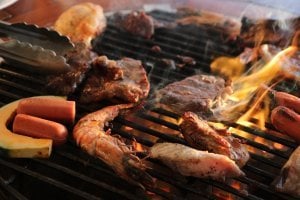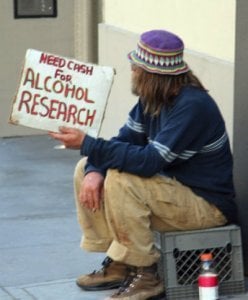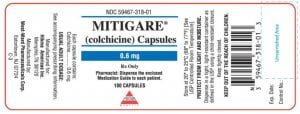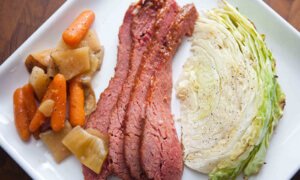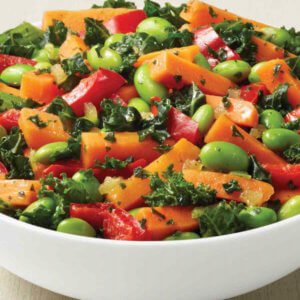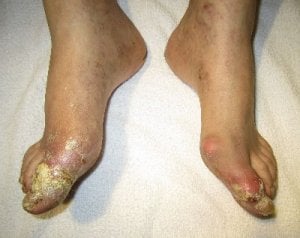If you want gout foods to avoid, calories are just as bad as purines.
Purines don’t just come from meat on your plate. They also come from meat on your bones. So more weight = more flesh = more uric acid.
Just like other animals, humans eat for energy, and to build new tissues. New tissue replaces old, but if we overeat, our bodies create extra tissue, and we get fat. Tissue replacement is an essential part of life, but the meat in our own bodies is just as much a source of uric acid as the food that we eat.
Eating excess purines will increase uric acid levels from your diet. Excess calories will do the same with body weight.
Gout is not simply about food, but where food is a contributory factor then calories are just as important as purines. In fact, they may play a bigger part in gout diet management as calories are contained in almost all foods, whereas purines that affect gout are only found in animal products and some fungal products, like mushrooms and yeast. Purines in vegetables can be ignored.
Counting Calories For Gout
There are no specific rules about your calorie intake. But there is good evidence to link higher risks of gout with higher Body Mass Index (BMI). Because obesity is a common cause of secondary gout. So, you need to assess your current weight and lifestyle. Especially, measure your height and weight. Also, you must know your uric acid test result number. Because the effects of weight loss on uric acid levels can be minimal if you are in the normal weight range.
There are several studies into the effects of weight on gout, including
- Obesity and Gout – Statistical links between weight and the risks of gout [1]
- Gout And Muscle Mass – Statistical links between muscle mass and gout [2]
- 40 30 30 Gout Diet – Specific effects of losing weight on gout [3]
As far as I am aware, none of these differentiate between over-producers and under-excreters of uric acid. Results vary, and you may find that losing weight does not significantly lower uric acid. However, personal experience tells me that reduced pressure on joints from weight loss does significantly help your quality of life.
One common problem with weight loss, especially rapid weight loss, is a rise in uric acid. I, therefore, recommend a gradual approach. Seek to slowly lower your calorie intake and gradually increase your activity levels. If you eat a little less and do a little more each day or even each week, you are most likely to see long-term weight loss and uric acid reduction. If you seek rapid weight loss, you must discuss this first with your doctor, and also ask for allopurinol starting two weeks prior to your weight loss program until the end of it.
BMI For Gout
Please use my temporary BMI Calculator pending a new version for this website.
Gout and Obesity: Next Steps
Calculate your Body Mass Index (BMI), and obtain your uric acid level. If you need to lose weight, do it slowly – two or three pounds a week is enough.
Practical tips include smaller portions (use a smaller plate size). Also, read food labels to always know what your calorie intake is. You can ask specific questions in the gout diet forum if you are struggling to lose weight.
 For a complete practical guide to avoiding foods that make gout worse, I am planning a step-by-step training course. This will guide you through making the right food choices for your personal circumstances. The course will show you how to plan gout diets that help your gout for the rest of your life. I will give you full help and support as you work through the course. If you want to get involved, please discuss ideas for this gout foods course.
For a complete practical guide to avoiding foods that make gout worse, I am planning a step-by-step training course. This will guide you through making the right food choices for your personal circumstances. The course will show you how to plan gout diets that help your gout for the rest of your life. I will give you full help and support as you work through the course. If you want to get involved, please discuss ideas for this gout foods course.
Leave Gout and Obesity to browse Gout Diet pages.
Gout and Obesity Related Topics
Please remember: to find more related pages that are relevant to you, use the search box near the top of every page.
Common Terms: calorie, Most Helpful Gout Pages, weight
Other posts that include these terms:
- High Alkaline Foods for Gout Diet Menu
- Gout Foods Table for Vegetables
- Gout Food List for GoutPal Foodies
- Foods High in Uric Acid Chart
- Purine Rich Foods
- Does Alcohol Affect Gout?
- Colchicine For Gout
Gout and Obesity: References
- Title: Obesity, Weight Change, Hypertension, Diuretic Use, and Risk of Gout in Men – The Health Professionals Follow-up Study. Authors: Hyon K. Choi, MD, DrPH; Karen Atkinson, MD, MPH; Elizabeth W. Karlson, MD; Gary Curhan, MD, ScD. Published: Arch Intern Med. 2005;165:742-748.
- Title: A prospective study of gout in New Zealand Maoris. Authors: GERHARD W. BRAUER AND IAN A. M. PRIOR. Published: Annals of the Rheumatic Diseases, 1978, 37, 466472.
- Title: Beneficial effects of weight loss associated with moderate calorie/carbohydrate restriction, and increased proportional intake of protein and unsaturated fat on serum urate and lipoprotein levels in gout: a pilot study. Authors: Dessein PH, Shipton EA, Stanwix AE, Joffe BI, Ramokgadi J. Published: Ann Rheum Dis. 2000 Jul;59(7):539-43. 40 30 30 Gout Diet
Please give your feedback
Did this page help you? If yes, please consider a small donation. Your donations help keep GoutPal's gout support services free for everyone.
If not, please tell me how I can improve it to help you more.
- YouTube
- The gout forums.




